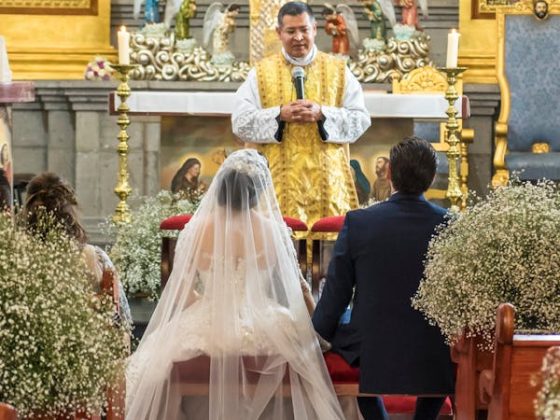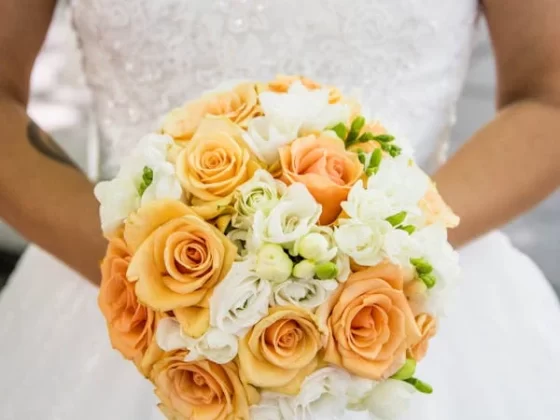
Planning a civil wedding ceremony provides numerous opportunities for personalization on your special day. Whether you desire an intimate gathering or a grand celebration, there are countless ways to infuse your civic ceremony with uniqueness and significance. This article offers straightforward civil ceremony ideas to guide you.
What is a civil wedding?
A civil wedding, also known as a civil marriage ceremony, is a legal union between two individuals officiated by a government official, such as a judge, justice of the peace, or civil registrar. Unlike religious weddings, civil ceremonies are non-religious and secular.
Typically held in a courthouse or city hall, civil weddings involve the exchange of vows and rings and the signing of a marriage license or certificate, which legally recognizes the couple’s marriage.
Civil weddings are often chosen by couples not affiliated with any specific religion or prefer a more straightforward, practical approach to getting married. While traditional weddings are celebrated widely, civil ceremonies offer an alternative that prioritizes personal choice and simplicity.
Ultimately, whether you opt for a civil or traditional wedding, what matters most is that you and your partner agree and are happy with your decision. It’s about choosing the path that best suits your preferences and values.
There are two methods for legally tying the knot, also known as having a civil wedding ceremony:
Registry Office Civil Weddings
Registry office civil weddings are often misconstrued as ceremonies. Still, they’re more akin to a swift legal procedure, ideal for couples seeking a fuss-free route to formalizing their union. Held in modest interview rooms sans embellishments like readings, music, or personal vows, these ceremonies prioritize efficiency over grandeur.
Lasting around 10 minutes, couples, accompanied by two witnesses, make their legal declarations and affix their signatures to the marriage register. Contrary to common belief, there’s no requirement for vows or ring exchanges; instead, the focus is solely on the legal aspects. It’s akin to signing any legal contract without ceremonial elements like floral arrangements or fanfare.
It’s crucial to distinguish between the act of legally marrying and the celebratory event of a wedding. Marriage signifies the legal union and commitment, while the wedding is the ceremonial celebration of that union. Thus, anniversaries commemorate the wedding, not the marriage itself.
Opting for this choice grants couples absolute autonomy over the officiant, venue, and timing of the ceremony, whether it’s the stroke of midnight or high noon. Moreover, they can curate the content to their liking, ensuring complete personalization, individuality, and uniqueness. This allows them to tailor every aspect to resonate with their heritage, culture, or personal narrative.
Any Approved Venues
Opting for a total civil wedding ceremony offers the convenience of being held at approved venues. Here’s how it unfolds:
Two registrars will be present—one to officiate and the other to handle paperwork. Before the ceremony, you’ll meet with each registrar individually. Unfortunately, registrar selection isn’t within your control; it depends on availability, often dictated by their busy schedules accommodating multiple daily ceremonies. Unlike wedding celebrants, who typically focus on one ceremony, registrars must accommodate various schedules.
The ceremony typically lasts around 20 minutes and adheres to strict guidelines. It’s legally prohibited from incorporating religious, cultural, or spiritual elements. Any deviations from the standard script require approval from the registrars in advance, including personalized vows, readings, and music.
This option appeals to those seeking to integrate legal marriage into the ceremony. It’s suitable for those comfortable with minimal personalization and relinquishing control over the ceremony’s content and leadership—essentially, a one-stop solution.
Premarital counseling can significantly contribute to setting the right priorities for your wedding or marriage.
The Civil Ceremony Ideas:
If you’re ready to exchange vows in an intimate setting with just a few loved ones present. Here are five tips to help you plan the perfect civil wedding:
-
Embrace Simplicity:
Unlike traditional weddings, civil ceremonies focus on the essence of the union without the elaborate trimmings. Could you keep it simple and heartfelt?
-
Choose Your Location:
One of the beauties of a civil wedding is its flexibility in venue choice. Whether it’s a courthouse, a picturesque park, or your backyard, pick a spot that resonates with you both.
-
Personalize Your Vows:
Since religious or cultural conventions do not bind you, tailor your vows to reflect your unique bond. Let your words speak from the heart.
-
Keep It Intimate:
The charm of a civil wedding lies in its intimacy. Invite only your closest family and friends to witness your special day, creating a warm and meaningful atmosphere.
-
Pay Attention to Legalities:
While a civil ceremony may seem less formal, don’t overlook the legal requirements. Ensure you obtain the necessary marriage license and fulfill any other legal obligations beforehand.
Following these tips, you can plan a civil wedding ceremony that’s true to your love story and creates cherished memories for years. Here’s to your happily ever after!

5 Reasons to Choose a Civil Wedding Ceremony
Civil weddings, also known as non-religious or secular weddings, have recently grown in popularity. With over 30 countries worldwide recognizing civil ceremonies, it’s no surprise that an increasing number of couples are choosing this option over traditional religious ceremonies. Here are five compelling reasons why a civil wedding ceremony might be the perfect choice for you:
Versatility
A primary benefit of opting for a civil wedding is its versatility. Civil ceremonies can occur in many settings, ranging from courthouses and city halls to picturesque parks and serene beaches.
This allows you to select a venue that perfectly reflects your vision for your special day. Moreover, you can choose a time and date that aligns seamlessly with your schedule without being limited by the availability of religious venues or officiants.
Additionally, you can choose whether to send out printed civil wedding invitations, further personalizing your celebration to suit your preferences.
Secular Option
Opting for a civil wedding is ideal for couples who aren’t religious. Civil ceremonies are entirely non-religious and secular, without religious prerequisites, regulations, or constraints.
You’re free to design the ceremony according to your own values and preferences without the need to adhere to specific religious customs or traditions. Additionally, you can choose any officiant without waiting for a particular religious figure to conduct the proceedings.
Budget-Friendly
A civil wedding is a cost-effective option. One of its significant advantages is the minimal expenditure compared to traditional religious ceremonies.
With no expenses for a religious venue or officiant, you can opt for a more straightforward, economical venue for your ceremony.
Furthermore, civil weddings tend to be less elaborate, allowing you to save on decorations and other costs commonly incurred in traditional religious weddings.
Informal Atmosphere
Civil wedding ceremonies typically embrace a less formal ambiance than traditional religious weddings. There’s no need to adhere to strict etiquette or don formal attire, offering the freedom to opt for a more relaxed, casual setting.
This relaxed approach can alleviate stress and anxiety on your wedding day, enabling you and your partner to fully immerse yourselves in each other’s presence and celebrate your love.
Inclusivity
Civil weddings are inherently more inclusive than traditional religious ceremonies. Being non-religious, they welcome couples of all faiths and backgrounds.
This means you can invite a diverse array of family and friends to join your celebration, irrespective of their religious beliefs or affiliations. Additionally, civil ceremony ideas can unite people and foster a sense of togetherness and inclusiveness.
In summary, there are numerous reasons why a civil wedding ceremony might be the perfect fit for you and your partner. From its flexibility and affordability to its secular nature and inclusivity, civil weddings offer a range of benefits that appeal to many couples.
Whether you desire a simple and intimate gathering or a more elaborate affair, a civil wedding presents an excellent opportunity to embark on your journey together as a married couple.
5 Steps to Organize Your Civil Wedding Ceremony
If you’re preparing for a civil wedding ceremony, there are numerous avenues to ensure your day is distinctive and memorable. Unlike conventional religious weddings, civil ceremonies provide ample room for customization. Here are five strategies to organize a civil wedding ceremony that resonates with your individuality and commemorates your love:
Conduct thorough research
While a civil wedding may seem straightforward, it’s essential to understand that you can’t simply stroll into the courthouse and declare your intention to marry your partner. Each state or jurisdiction has its own set of regulations governing the issuance of marriage licenses, so it’s crucial to investigate before making any decisions.
Civil ceremonies generally adhere to similar requirements as religious ones, including fees for the marriage license, restrictions such as minimum age, permissible wedding venues, required documentation, potential waiting periods, and the necessity of having a couple of witnesses or more present.
For instance, marriage laws in the United States typically permit individuals to marry upon reaching 18 years of age, with exceptions such as Mississippi, where the general marriage age is 21, and Nebraska, where the minimum marriage age is 19.

Choose a significant Venue.
One advantage of opting for a civil wedding ceremony is the freedom it provides regarding the venue. You can select a location that is significant for you and your partner, be it a beloved park, beach, historic landmark, or backyard.
Moreover, if you know and comply with the legal requirements, you can hold your civil wedding in any country. Consider the ambiance and atmosphere you wish to evoke during your ceremony and opt for a venue that aligns with your vision.
Craft heartfelt vows
Crafting your vows is a beautiful opportunity to add a personal touch to your civil wedding ceremony and articulate your deep love and dedication to each other.
Take some moments to reflect on your relationship, recalling how you first met, the cherished memories you’ve created, and the promises and commitments you wish to make to one another.
Feel empowered to inject your unique personality into your vows. After all, it’s your civil wedding, and expressing yourself authentically is critical to making the moment memorable.
Select significant quotes or melodies.
Beyond your vows, consider incorporating meaningful quotations or music that hold significance for you and your partner into your civil wedding ceremony. This could involve incorporating poems, quotes, or passages from your favorite literature or texts.
Similarly, choose music with a special place in your heart or invite a beloved musician to perform, even as a surprise. These elements can help set the tone for your ceremony, fortify the foundation of your marriage, and create a more profound and lasting memory of your special day.
Share the joy with loved ones.
Lastly, embrace the opportunity to celebrate your love and dedication with your cherished family and friends. While civil wedding ceremonies tend to be more intimate than their religious counterparts, you can still extend invitations to your nearest and dearest to join the festivities.
Consider arranging a reception or a cozy gathering following the ceremony, where you can relish good food, drinks, and the warmth of companionship.
Additional details about civil wedding ceremonies
Here are some commonly asked and searched questions regarding civil wedding ceremonies.
How long does a civil wedding ceremony last?
The duration of a civil marriage ceremony varies based on factors such as the preferences of the couple and the location.
Generally, a civil wedding can last a few minutes to several hours. While the ceremony may only take a few minutes, additional time may be needed to sign the marriage certificate and capture photographs.
Does the Catholic Church recognize a civil marriage?
Typically, marriages conducted outside of the Catholic Church are not recognized. In Catholicism, weddings must be officiated by Catholic clergy and meet the standards outlined by the Catholic Church to be considered sacramental marriages.
Marriage is considered a sacrament within Catholic doctrine, symbolizing the union between Christ and the Church. Therefore, adherence to Catholic canon law is necessary for a marriage to be considered sacramental.
Conclusion:
From selecting a meaningful venue to crafting personalized vows, incorporating significant quotes or music, and sharing the joy with loved ones, you can design a civil wedding ceremony that embodies your personality and celebrates your love journey.












